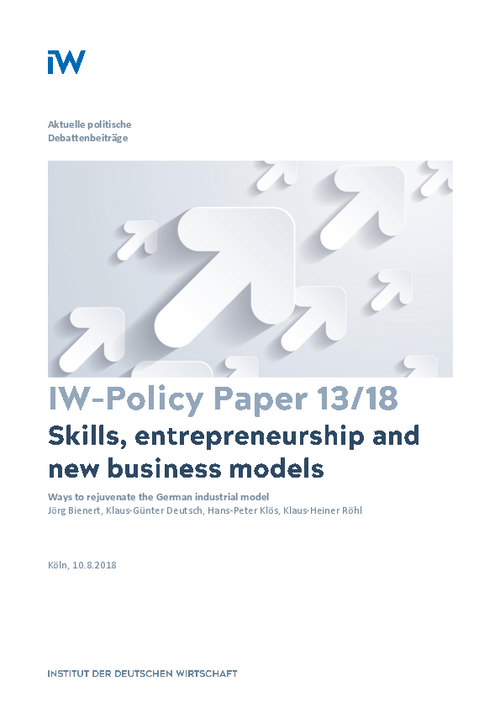This paper identifies key areas for leaders to keep the “German model” successful, from developing digitized business cases to future skill requirements and ways to foster entrepreneurship.

Ways to rejuvenate the German industrial model: Skills, entrepreneurship and new business models
IW-Policy Paper

This paper identifies key areas for leaders to keep the “German model” successful, from developing digitized business cases to future skill requirements and ways to foster entrepreneurship.
New business models are at the heart of the global competitive challenge. In several areas of manufacturing and closely related services industries, new market participants, business models and technologies lead to faster change in market conditions and the competitive environment. These developments pose new challenges for the successful German industrial system. Strategic treatment of innovation, a stronger focus on disruptive technologies or business models, organizational experimentation such as spin-outs to retain entrepreneurial employees, less intra-corporate bureaucracy in such ventures and the interaction with new business partners are key elements to master the evolving challenges. Entrepreneurship, new business models and innovation in rapidly changing markets should be fostered by focused approaches of management and general economic policies. This includes measures to facilitate to entrepreneurship education, an entrepreurial culture and corporate training.
Public policy should strengthen innovation and entrepreneurship through direct funding programmes for research and development of new products. This can be accomplished through a well-designed system of tax exemption of corporate R&D activities and by providing broad tax incentives for implementing new technologies in private investment, in partic-ular by small and medium-sized firms. Public policy should also reform their systems of investment promotion by tax schemes or direct funding in terms of the definition of innova-tion itself. The same holds for fostering collaborative ventures and an innovation friendly treatment of collateral and liability issues. The goal is to establish a well-capitalized and effective system for innovation financing using private capital sources ranging from seed capital over venture capital up to investment into high tech companies.
Rapid expansion of modern broadband and 5G mobile infrastructure is absolutely essential for new business models and technologies in a broad range of industries. Fostering eGovernment initiatives is highly necessary to cut red tape in public administration. The legal framework improvements in areas such as data protection and use and liability law should reflect openness for new business models and technologies. In this context, a special focus should be laid on digital technologies in public, private and corporate education and training.

Jörg Bienert / Klaus-Günter Deutsch / Hans-Peter Klös / Klaus-Heiner Röhl: Skills, entrepreneurship and new business models
IW-Policy Paper


Einrichtungen zum Technologie- und Wissenstransfer an Hochschulen
In den letzten Jahren haben sich an den meisten deutschen Hochschulen zentrale Transfereinrichtungen etabliert. Allerdings sind ihre Aufgabenspektren und Kompetenzen teilweise sehr unterschiedlich. So lässt sich ihr wirtschaftlicher und gesellschaftlicher ...
IW
Mehr Dynamik in der Unternehmenslandschaft notwendig
Die wirtschaftliche Transformation hin zur Klimaneutralität erfordert auch einen Wandel in der Unternehmenslandschaft, der neben umfassenden Umstellungen in Bestandsfirmen mit Gründungen und Schließungen verbunden ist.
IW